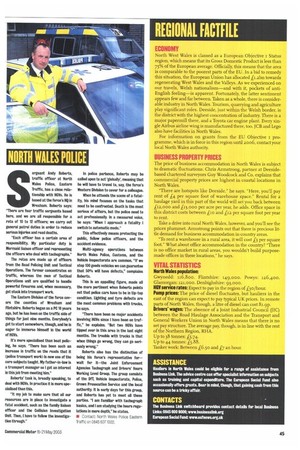NORTH WALES POLICE
Page 45

If you've noticed an error in this article please click here to report it so we can fix it.
Sergeant Andy Roberts, traffic officer at North Wales Police, Eastern Traffic, has a close relationship with HGVs. He is based at the force's HQ in Wrexham. Roberts says: 'There are four traffic sergeants based here, and we are all responsible for a rota of 10 to 12 officers; we carry out general patrol duties in order to reduce serious injuries and road deaths.
"Each officer has a certain area of responsibility. My particular duty is Mermaid liaison officer and representing the officers who deal with tachographs."
The rotas are made up of officers from the Road Policing Unit and Tactical Operations. The former concentrates on traffic, whereas the men of Tactical Operations unit are qualified to handle powerful firearms and, when necessary, get stuck into transport work.
The Eastern Division of the force covers the counties of Wrexham and Hintshire. Roberts began as a PC 18 years ago, but he has been on the traffic side of things for just nine months. Everybody's got to start somewhere, though, and he is eager to immerse himself in the world of HGVs.
It's more specialised than beat policing, he says. "There has been such an increase In traffic on the roads that it (police transport work) Is now one of the core subjects taught. My father-in-law is a transport manager so I got an interest in this job from meeting him."
Roberts' task Is, broadly speaking, to deal with HGVs. In practice it is more specialised than this.
"It my job to make sure that all our resources are in place to investigate a fatal accident, such as the family liaison officer and the Collision Investigation Unit. Then, I have to follow the investigation through." In police parlance, Roberts may be called upon to act 'globally', meaning that he will have to travel to, say, the force's Western Division to cover for a colleague.
When he attends the scene of a fatality, his mind focuses on the tasks that need to be confronted. Death is the most serious of affairs, but the police need to act professionally. In a measured voice, he says: "When I approach a fatality I switch to automatic mode."
This effectively means protecting the public, fellow police officers, and the accident evidence.
Multi-agency operations between North Wales Police, Customs, and the Vehicle Inspectorate are common. "If we stop 100 goods vehicles we can guarantee that 50% will have defects," complains Roberts.
This is an appalling figure, made all the more pertinent when Roberts points out that police cars have to be in tip-top condition. Lighting and tyre defects are the most common problems with trucks, he says.
"There have been no major accidents involving HGVs since I have been on traffic," he explains. "But two HGVs have tipped over in this area in the last eight months. The trouble with trucks is that when things go wrong, they can go seriously wrong."
Roberts also has the distinction of being his force's representative for— wait for it—the Joint Enforcement Agencies Tachograph and Drivers' Hours Working Level Group. The group consists of the KT Vehicle Inspectorate, Police, Crown Prosecution Service and the local authority. it is early days for this group. and Roberts has yet to meet all these parties. "I am familiar with tachograph basics, and I am studying the hours regulations in more depth," he states.
*Contact: North Wales Police Eastern Traffic on 0845 607 1002.




























































































































































